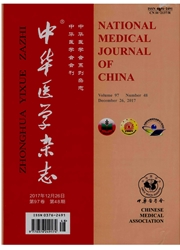

 中文摘要:
中文摘要:
目的探讨幽门螺杆菌(Hp)感染与胃癌组织中能量代谢相关基因的表达及甲基化修饰的相关性。方法选择贵州省肿瘤医院(原贵阳医学院附属医院肿瘤科)2005年1月至2009年12月经病理检查确诊的30例患者的胃癌组织、转移淋巴结组织及癌旁组织标本各30份,应用实时荧光定量反转录.PCR(RT-PCR)定量检测乳酸脱氢酶(LDH)、二氢硫辛酰胺脱氢酶(DLD)及Ran-特异性GTP酶活化蛋白(RanGAP)基因的表达量,并分析其与Hp感染的关系。用亚硫酸氢盐测序法(BSP)检测Hp感染细胞后LDH、DLD及RanGAP基因启动子区CpG岛甲基化修饰状态。结果癌旁组织、胃癌组织及淋巴结组织中LDH基因的相对表达量分别是1.0,3.1和3.0,DLD基因分别是1.0,3.1和2.8,而RanGAP基因分别是1.0,0.4和0.5,差异均有统计学意义(均P〈0.05)。胃癌组织中Hp感染组LDH、DLD和RanGAP基因的表达量高于无Hp感染组(2.3比1.0,3.0比1.0及2.6比1.0,均P〈0.05)。Hp感染的胃癌细胞及高表达cagA基因的胃癌细胞中LDH基因启动子区-2325位点和DLD基因启动子区-1885位点发生去甲基化修饰,而RanGAP基因启动子区-570位点和-170位点发生高甲基化修饰。结论Hp感染可能通过诱导LDH、DLD及RanGAP基因启动子区发生异常甲基化而上调LDH、DLD基因及下调RanGAP基因的表达,从而参与胃癌的发生发展。
 英文摘要:
英文摘要:
Objective To explore the association between the Helicobacter pylori (H. pylori ) infection and the expression and methylation of energy-related genes in gastric cancer. Methods Real-time fluorescence quantitative reverse transcription (RT)-PCR was performed to quantify the expressions level of lactate dehydrogenase (LDH), dihydrolipoamide dehydrogenase (DLD) and Ran-specific GTPase-activating protein (RanGAP) genes in the samples of human gastric cancer (n = 30), metastatic lymph node (n = 30) and peri-cancerous tissues (n = 30) as confirmed by pathological examinations. Those patients were chosen of Affiliated Hospital of Guiyang Medical University, from January 2005 to December 2009. The relationship between the gene expression and H. pylori infection was analyzed. The methylation of LDH, DLD and RanGAP genes at promoter CpG island was measured by bisulfite sequencing(BSP). Results The relative gene expressions of LDH, DLD and RanGAP in peri-cancerous tissues, gastric cancer and metastatic lymph nodes were 1.0, 3.1, 3.0 and 1.0, 3.1 ,2.8, and 1.0, 0.4, 0.5 respectively (all P〈0.05).The expression levels of LDH and DLD genes in H. pylori-positive gastric cancer was high than those in the negative group (2.3 vs 1.0, 3.0 vs 1.0, 2.6 vs 1.0, all P 〈 0. 05 ). The demethylation of LDH and DLD genes at promoter -2325 and -1885 site as well as the overmethylation of RanGAP gene at the promoter -570 and - 170 sites respectively were detected in H. pylori infection and cagA-overexpressed ceils. Conclusion H. pylori infection may promote the development and progression of gastric cancer by inducing the aberrant methylation of LDH, DLD and RanGAP genes to up-regulate the gene expressions of LDH and DLD and down-re,late the zene expression of RanGAP.
 同期刊论文项目
同期刊论文项目
 同项目期刊论文
同项目期刊论文
 期刊信息
期刊信息
